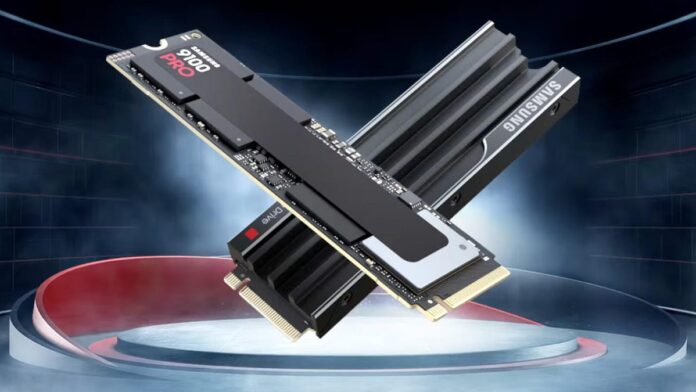Comply with ZDNET: Add us as a most popular supply on Google.
ZDNET’s key takeaways
- An 8TB PCIe SSD that is provided with or and not using a heatsink.
- Learn and write speeds of as much as 14,800 and 13,400 MB/s, respectively.
- Good for laptops and desktop with PCIe 5.0, and PlayStation 5.
In search of an 8TB PCIe 5.0 SSD? Effectively you are in luck, as a result of Samsung has introduced an 8TB variant of its wonderful 9100 Professional M.2 2280 SSD. However such a powerful SSD goes to return with an equally spectacular price ticket.
The 8TB mannequin is accessible from Samsung’s retailer for $999.99, and that is for the naked drive. If you’d like the model with the heatsink, that’ll set you again a cool $1,019.99.
However for those who want it, you want it. In my expertise, Samsung SSD heatsinks are among the many finest. Even with the heatsink, the drive remains to be solely 8.8 millimeters (0.35-inch) thick, which may be very svelte as SSDs with a heatsink go.
Digging via the spec sheet, it is clear that the 8TB 9100 Professional packs some critical horsepower. It is able to sequential reads of as much as 14,800 MB/s, and writes as much as 13,400 MB/s, which is similar because the 4TB model of the 9100 Professional, however twice as quick because the 990 PRO SSD line. Random learn and writes are equally spectacular, at 2,200K and a couple of,600K IOPS, respectively.
This drive is prepared for the hardest workloads, from AI, 4K/8K video rendering, and, after all, gaming (sure, in addition to being suited to a laptop computer or desktop, this may even work within the PlayStation 5).
Samsung’s new 5-nanometer controller, the chip on the coronary heart of this drive, claims an influence effectivity of as much as 49% in comparison with the 990 PRO SSD, which suggests the drive has much less waste warmth to take care of. However regardless of this, if you are going to be pushing this drive near its limits, I extremely advocate dropping the additional $20 on the heatsink.
Simply keep in mind, to get the absolute best efficiency, you’ll need a system that makes use of PCIe 5.0, so it is price checking earlier than dropping this a lot money on the drive.
Endurance will get a giant bump, as much as 4,800 TBW (which stands for Terabytes Written, a measure of how a lot knowledge could be written to the drive earlier than it is executed for), double the two,400 TBW of the 4TB model. MTBF (Imply Time Earlier than Failure) is rated at 1.5 million hours, which is fairly typical for an M.2 SSD.
As I stated, 8TB SSDs are skinny on the bottom, however at $1,000, this is among the priciest available on the market, so for those who’re in search of one thing a bit extra reasonably priced, then search for SSDs from WD, Lexar, or Sabrent. These are PCIe 4.0 drives, so that you’re getting about half the velocity, however the value tags are a bit extra — however not much more — palatable. Should you’re system would not help PCIe 5.0, that is the drive to get.
Actually, the one different 8TB PCIe 5.0 SSD I do know of that is been introduced is within the WD-BLACK SN8100 lineup, and I do not know when that is going to land.

